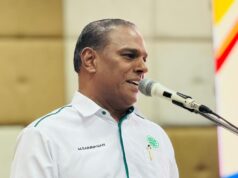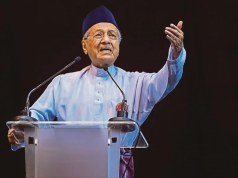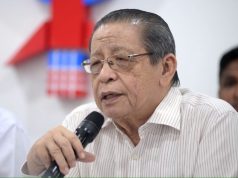KUALA LUMPUR, Aug 14- Exactly 100 days Tuesday after Datuk Seri Najib Tun Razak took his oath of office as prime minister following the 13th General Election (GE13), he continues to be committed to tackling reconciliation challenges in efforts to maintain national stability.
Several quarters feel that this is his biggest challenge following disunity and discord which have become apparent after the last general election in May.


“The biggest challenge is how to get back the citizens to think as Malaysians.
“That is the challenge for the 14th general election, to see if voters generally vote as Malaysians or continue to vote according to their race,” he told Bernama.
In terms of development, he said, it was important that the people see the government execute the development plans that were drawn up even before the elections.
Also voicing the same views, social activist Tan Sri Lee Lam Thye wants to see racial unity strengthened under the 1Malaysia concept.
“Our hopes for racial unity under the 1Malaysia concept may not be possible if certain quarters continue to use racial politics,” he said.
Therefore, he hoped the prime minister would be more firm on the unity issue as it was vital in the national development agenda towards achieving high-income nation status by 2020.
This commitment has been translated by the prime minister through the National Harmony Act which is being drawn up to replace the Sedition Act 1948, by assuring the government’s authority will not be eroded in handling actions which threaten unity and harmony in the country.
Although the government would like to ensure freedom of speech for every citizen, that freedom cannot be misused to the point of affecting unity and harmony.
Clearly, Najib’s main focus since given the mandate again is to bring together Malaysians who had been in discord during the last general election and which has developed into racial polarisation.
In rebuilding unity and forging better race relations, Najib had on June 26, proposed the formation of the National Unity Consultative Council.
Security is also part of the government’s main agenda to provide a safe environment for the people.
The commitment was demonstrated by the government’s preparedness to assist the security forces, especially the Royal Malaysian Police, do whatever it takes to increase efficiency and capability in combating crime.
A small committee comprising some cabinet ministers, including the Home Minister and Minister in the Prime Minister’s Department, was set up to discuss with the Attorney-General and Inspector-General of Police to determine the additional legal provisions which could enhance police capacity in taking action.
On the issue of security, Lee, who is also Malaysian Crime Prevention Foundation (MCPF) vice-chairman, said there were efforts and commitment by the government under Najib to tackle the issue, especially crime.
“To ensure what the PM says becomes a reality, his orders must be implemented at all government levels so that the security issue can be resolved more effectively,” he added.
Besides that, the government also discussed various views on the necessity of drafting a new bill similar to the Emergency Ordinance (EO) 1969 which was abolished in 2011.
Other than the views of the police and Attorney-General, the government will also take into account the views of other quarters such as the Human Rights Commission of Malaysia (Suhakam) and Bar Council.
Earlier this month, Home Minister Datuk Seri Dr Ahmad Zahid Hamidi who was reportedly discussing with Attorney-General Tan Sri Abdul Gani Patail on drafting the new bill, said after the EO was abolished, more than 2,600 inmates of the Simpang Renggam detention centre in Johor were released and they then returned to crime.
He said since the EO was abolished, serious crime cases increased by 90 per cent and involved ex-convicts.
In the BN Aku Janji for the GE13, the government promised to reduce car prices and review the National Automotive Policy.
The result of this could be seen in several models from Peugeot, Proton, Perodua and Honda having lower prices for the first phase from January to May this year.
It was reported that the price reduction plan could be carried out by lowering excise duty in stages for car manufacturers which use more local components.
As the government intends to provide more quality and affordable houses, it announced the construction of 100,000 units under the 1Malaysia Public Housing Project (PPA1M) in July.
Measuring between 1,000 and 1,500 square feet, the houses offered under the PPA1M scheme range from RM150,000 to RM300,000 in price.
Federation of Malaysian Consumers Associations (FOMCA) president, Datuk N.Marimuthu lauded the government for making good its promises, saying it was a good start to the 60 months of Najib’s second term as prime minister.
However, he hoped the government would continue to give attention to the issues of cost of living, health, education and public transport, which are very important to the low-income group.
Najib is also committed to improving governance and integrity across all segments, besides intensifying efforts to wipe out corruption and abuse of power.
He said to prove the government’s seriousness in tackling the issues of governance, integrity and corruption, it had come up with a comprehensive integrity plan.
“Details on the plan will be announced soon,” he had reportedly said.
In the coming five years, the government will improve implementation of the National Transformation Programme to ensure continuous economic growth and to also reduce inflation and cost of living, unemployment and crime.
Under Najib’s leadership, the government will work at ensuring access to quality education, healthy foreign and domestic investment rates and increased national competitiveness, besides reducing the infrastructural development gap and urban-rural income disparity.
– BERNAMA










